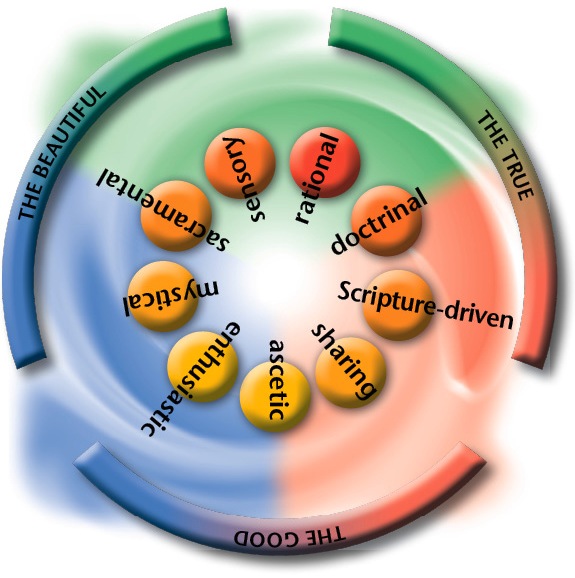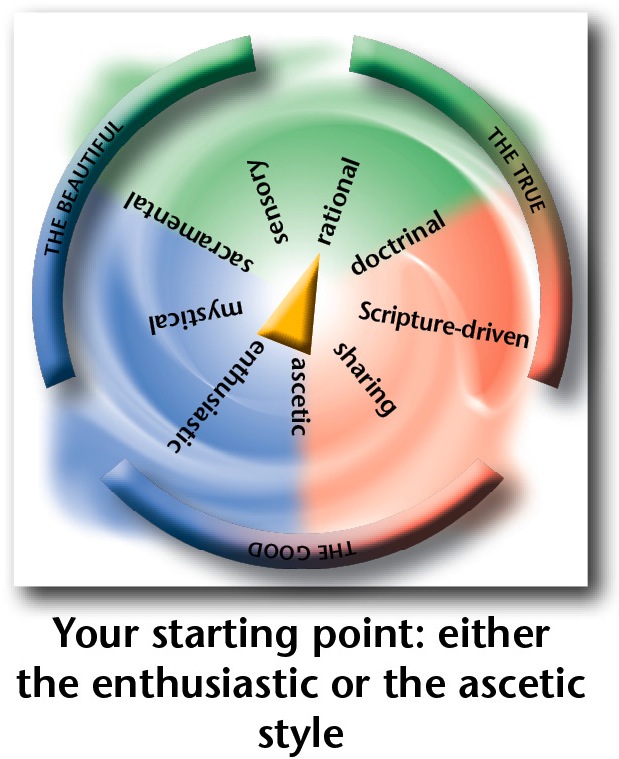What fascinates me about my rational mentor Thomas
T
here are many things that I admire about Thomas, not least of which is his sharp mind. However, what really impresses me is not so much his intellect, but his modesty. His latest book has the revealing title: “About God‘s Modesty.” And this modesty is reflected by Thomas as well, which isn‘t necessarily typical of representatives of the rational style. In most of the 80 e-mails that we have exchanged over the past months, there is a remarkable sense of self-mockery, the attitude that he doesn‘t take himself too seriously. Thomas can take a distanced perspective on himself. He not only questions my positions through his constant “but,” but he questions his own positions as well. Barely have I summarized one of his statements in my own words, when he again reacts with a “but.” He relativizes me, he relativizes himself. What he doesn‘t relativize, it seems to me, is truth itself.
 Graphical representation of the rational style: It is essential to understand the positioning of this style within the Trinitarian Compass. Christians with a rational style should take into special consideration the two opposite styles (ascetic and enthusiastic) as these throw light on the dark side of the rational style.
Graphical representation of the rational style: It is essential to understand the positioning of this style within the Trinitarian Compass. Christians with a rational style should take into special consideration the two opposite styles (ascetic and enthusiastic) as these throw light on the dark side of the rational style.
On the one hand, the rational style belongs to the green style family; on the other hand, to the dogmatic style family. Depending on its leaning toward one of its two neighbor styles, it can manifest itself in a more sensory or doctrinal variety. For Christians with a rational style, it is most natural to express their spirituality through mental activity. The strength of this style is its reflective ability; the peril is its tendency to overstress the rational component (intellectualism).
 For Christians with a rational style, thinking has a prominent place in their approach to God. Science and logic are not seen as opposing faith, but play an important part in their spirituality.
For Christians with a rational style, thinking has a prominent place in their approach to God. Science and logic are not seen as opposing faith, but play an important part in their spirituality.
To those approaching the rational style from the opposite side
 If your own starting point is the ascetic or the enthusiastic style, it could be that you have considerable difficulty warming up to the rational style. Isn‘t it purely “head faith?” Is it faith at all? Isn‘t it more important to believe with your heart (enthusiastic style)? And isn‘t it more important to demonstrate with your whole life that the message of the gospel has fallen on fertile ground (ascetic style)? You are right. These are essential, and there is no question that there are representatives of the rational style who have greatly neglected these two dimensions.
If your own starting point is the ascetic or the enthusiastic style, it could be that you have considerable difficulty warming up to the rational style. Isn‘t it purely “head faith?” Is it faith at all? Isn‘t it more important to believe with your heart (enthusiastic style)? And isn‘t it more important to demonstrate with your whole life that the message of the gospel has fallen on fertile ground (ascetic style)? You are right. These are essential, and there is no question that there are representatives of the rational style who have greatly neglected these two dimensions.
However, you shouldn‘t forget that Jesus never said, “The most important thing is to believe with your heart. Your mind isn‘t that important.” Sure, he commanded you, unmistakably, to love God “with all your heart” and “with all your will”—but he also commanded you to love him “with all your mind.” Could it be that you need to grow in that specific area of your love for God? And could it be that in this area you could learn an awful lot from representatives of the rational style?
When you think about representatives of the rational style, the image of one who continually criticizes, rarely experiences God (and gives all Christians who do a guilty conscience), may come to mind. Maybe you can no longer hear their criticism, since you sense that it is not just directed against sentimental superstition, but against any kind of dynamic faith. Consequently, you close your ears whenever you face such criticism. If this is true, you are in danger of not hearing a message that could be most helpful for you. You should never forget that an uncritical faith is not necessarily a sign of a strong faith; sometimes it is simply a sign of poor thinking. To translate this into Jesus‘ terminology: Poor thinking could be an indication that your “love for God” is deficient, that you don‘t love God with “all your mind.” Could the lack of a critical mindset be an indication of a lack of love for God? You should at least think about this possibility.
Your goal should not be to reduce your enthusiasm for God, your anticipation of the supernatural work of the Holy Spirit, or your commitment to Christ—not even in the slightest way. On the contrary, these are your strengths, and it is important to continue growing in this area. However, it would be profitable for you to give the rational component of your spirituality higher value. The result would be to experience God deeper, better, more holistically, and especially in a more crisis-proof way. The fire of doubt that is linked to the rational style, can become an experience through which your own faith gains power and depth.
Further topics in the above chapter of the full version of the book
Thomas, my mentor for the rational style - Rationality as a family heritage - Loving the abstract - A distrust of simplistic answers - A life of unanswered questions - A man of humility - The core of the rational style: Applying logic in your approach to God - The two wings of the rational style - The strengths of the rational style - The perils of the rational style - Thinking and believing are not opposites

